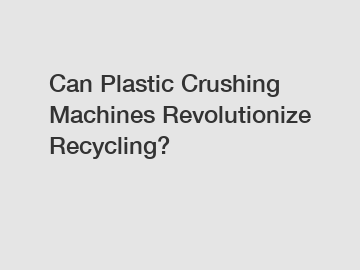Can Plastic Crushing Machines Revolutionize Recycling?
Can Plastic Crushing Machines Revolutionize Recycling?
Plastic pollution has become a pressing concern worldwide, with an alarming amount of plastic waste accumulating in landfills, oceans, and our environment. In an effort to combat this crisis, various technologies and innovations have been developed, among them, plastic crushing machines. These machines have the potential to revolutionize recycling and transform the way we deal with plastic waste. But can they truly make a significant impact in tackling this global issue? Let's delve into this question and explore the potential of plastic crushing machines in recycling.
1. Efficient Processing of Plastic Waste:

Plastic crushing machines are designed to break down plastic waste into smaller, manageable pieces. By doing so, they make recycling more efficient and effective. These machines can handle a wide range of plastic materials, including bottles, containers, and packaging, reducing them to a size suitable for further processing. With their ability to process large quantities of plastic waste quickly, they have the potential to increase recycling rates significantly.
2. Reduced Volume and Transportation Costs:
Plastic waste, in its original form, takes up a significant amount of space, making transportation and storage costly and inefficient. Plastic crushing machines address this issue by reducing the volume of plastic waste. By compressing the waste into smaller pieces, these machines facilitate easier and cost-effective transportation. The reduced volume also opens up valuable space in landfills, making them more environmentally sustainable.
3. Enhanced Sorting and Segregation:
Separating different types of plastic waste is a crucial step in the recycling process. Plastic crushing machines can aid in this aspect by breaking down plastics into smaller fragments, making it easier to sort and segregate them based on their composition. This simplifies the recycling process and ensures that plastic waste is appropriately recycled and not mixed with incompatible materials.
4. Facilitating Downstream Recycling Processes:
After plastic waste is crushed into smaller pieces, it undergoes further processing to transform it into reusable materials. Plastic crushing machines play a pivotal role in this downstream recycling process. The crushed plastic can be melted and molded into new products or used as raw materials in manufacturing industries. By breaking down plastic waste, these machines enable a circular economy, where plastic can be repeatedly recycled and reused.
Plastic crushing machines undoubtedly offer several advantages in recycling processes. However, some challenges and considerations must also be taken into account:
1. Energy Consumption:
The operation of plastic crushing machines requires energy, leading to a potential increase in carbon footprint. To ensure their environmental viability, it is crucial to use energy-efficient machines and explore renewable energy sources to power them. Additionally, incorporating energy-saving features and technologies into these machines can further reduce their impact on the environment.
2. Contamination and Quality of Recycled Materials:
While plastic crushing machines aid in the recycling process, there is a risk of contamination and degradation of the quality of recycled materials. Contaminants, such as non-plastic items, can be mistakenly crushed along with plastic waste, leading to inferior recycled products. Ensuring proper sorting and regular maintenance of crushing machines can mitigate this challenge.
3. Infrastructure and Investment:
Adopting plastic crushing machines on a large scale requires significant infrastructure and investment. Recycling facilities need to invest in these machines, along with auxiliary equipment for sorting and processing. Governments and policymakers should provide necessary support and incentives to encourage the implementation of this technology. Collaboration between public and private sectors can further accelerate the adoption of plastic crushing machines.
In conclusion, plastic crushing machines hold great potential in revolutionizing recycling processes and addressing the plastic waste crisis. They improve efficiency, reduce waste volume, facilitate downstream recycling, and enhance sorting capabilities. However, challenges regarding energy consumption, quality control, and infrastructural requirements need to be addressed. With proper investment, regulation, and technological advancements, plastic crushing machines can play a crucial role in minimizing plastic pollution and shaping a more sustainable future. It is essential for all stakeholders, from individuals to governments, to recognize the significance of this technology and work collectively towards its widespread adoption. Can plastic crushing machines revolutionize recycling? The answer lies in our commitment to embracing innovation and taking proactive steps to combat the plastic waste epidemic.
For more information, please visit plastic bottle crusher for sale, pet plastic bale breaker machine, crusher plastic machine.


